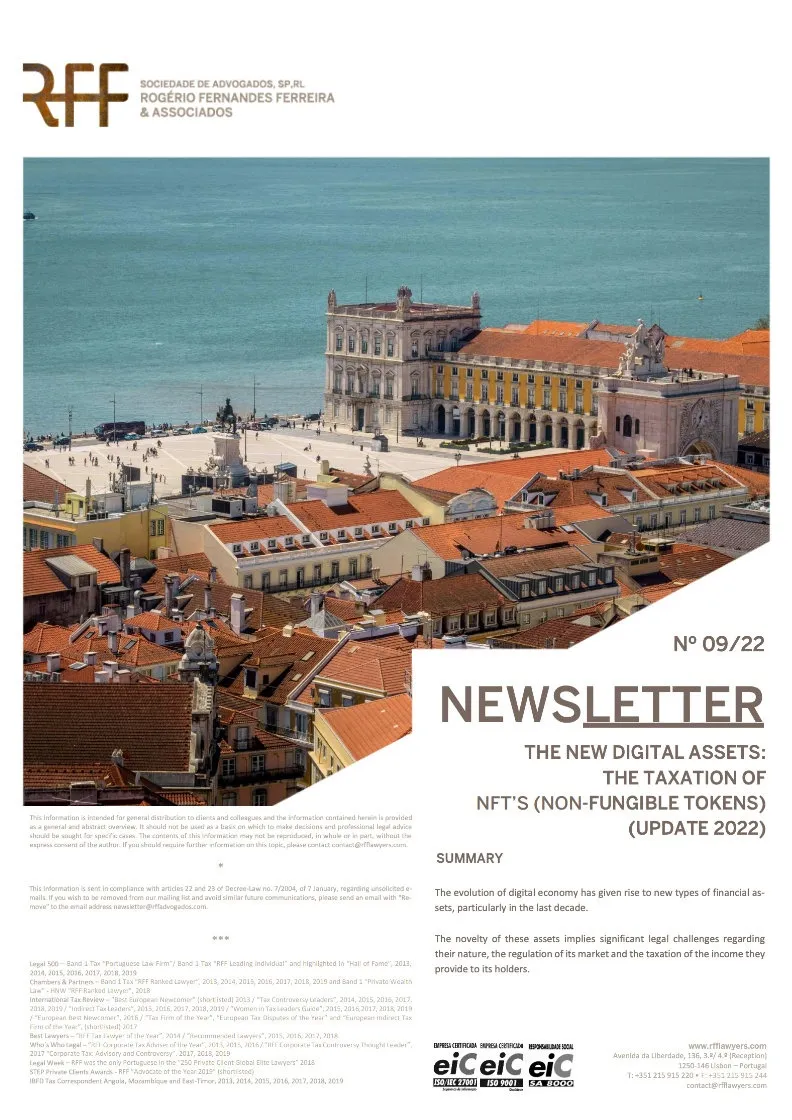The New Digital Assets: The Taxation of NFT’s (Non-Fungible Tokens) (UPDATE 2022)

The New Digital Assets: The Taxation of NFT’s (Non-Fungible Tokens) (UPDATE 2022)
SUMMARY
The evolution of digital economy has given rise to new types of financial assets, particularly in the last decade.
The novelty of these assets implies significant legal challenges regarding their nature, the regulation of its market and the taxation of the income they provide to its holders.
BACKGROUND
The evolution of the world and the digital economy has led to the creation of new types of economic and financial assets, which, particularly in the last decade, have grown exponentially.
The novelty of these assets implies significant legislative challenges, particularly with regard to their legal nature, the regulation of the respective market, as well as the taxation of the income that these assets generate for their holders.
Since the legal and tax challenges brought by cryptocurrencies are already known - and even before stable and solid solutions are in sight among us - non-fungible tokens (NFTs) have emerged.
In short, NFTs are digital assets, supported by blockchain technology, that represent unique, collectible, tangible or intangible products that can be freely traded.
Blockchain technology is a type of database that stores its information in sequential sets - the so-called "blocks".
Whereas a "traditional" database tends to store the information it contains in a relatively individual cluster, in order to facilitate its search and filtering, in a blockchain the information is automatically stored in data clusters with limited capacity.
As the content of a blockchain is freely consultable, this type of database operates as a type of digital public register, or as a stable and decentralized chronology of data, since when the limited capacity of each block is reached, it is locked, given a timestamp, and added to a chain of information, allowing its origin to be traced.
The great advantage of blockchain technology relates to its reliability since it allows for the verification of its origin and authenticity with a greater degree of certainty when compared to other types of databases.
NON-FUNBIBLE TOKENS
Unlike bitcoin and other cryptocurrencies, which are fungible – the value of a bitcoin, in a given moment, is the same as any other bitcoin, and easily exchanged for regular, legal currency – NFTs are unique, as each one represents a specific tangible or intangible asset with a digital certificate of authenticity that can be traced back to its creator or original seller, by virtue of blockchain technology.
Beyond their non-fungibility, NFTs are also indivisible, unlike cryptocurrencies, which can be subject to a partial investment, if desired.
Each NFT is also indestructible and impossible to replicate or falsify, again due to the security granted by the blockchain.
NFTs can represent many different types of assets, with a value deriving from the uniqueness or rarity of those assets. As different as they are, works of art, collectible trading cards, sports cards, digital fashion items or even social media posts, can be converted into and traded as NFTs.
As such, regarding the variety of assets that NFTs can represent, it is possible to conclude that, as far as the eye can see, the possibilities are endless.
Historically, the digital trade of these categories of assets was followed by a significant degree of uncertainty, which limited their value, mostly, due to the fact that their authenticity was always difficult to confirm,
However, through the creation of NFTs, which function, on the one hand, as a register, certifying ownership and authenticity, and on the other hand, as a tradeable deed of these categories of assets, there has been significant growth in this market in recent years.
In fact, according to press, the volume of NFT sales went from USD 94.9 million in 2020 to USD 24.9 billion in 2021, which proves the growing popularity of these assets.
The growing variety of possible applications of this technology is astounding, considering, as an example, its usage in the music (the singer Grimes sold 3.000 NFTs in a 48-hour online auction, earning 6 million USD in the process) and sports (NBA Top Shot) industries.
Its credibility was strengthened by Christie’s, a famous auction house, which held the first-ever NFT auction, a piece from the artist Beetle, with astonishing results. While bidding is still ongoing, the highest bid is around 2 million USD and the starting bid was merely 100 USD.
The technology behind NFTs allows not only to certify a work’s authenticity, but it also solves an old problem in artistic creation, as it is possible to insert royalties into the NFTs programming, which provides an income source for the NFT’s creator each time it is sold.
TAXATION CHALLENGES
Similar to what has been said about the taxation of the income derived from cryptocurrencies, NFTs should also fall in a legal limbo, particularly due to the apparently unlimited variety of assets they can represent.
In fact, tax laws are necessarily typified, to prevent the taxation of income that is not explicitly foreseen in their scope. This characteristic is, precisely, what reduces the flexibility of tax laws to respond to the challenges posed by the new realities of the digital age.
This lack of flexibility when it comes to tax laws is a common issue in many different jurisdictions.
In Portugal’s case, income from NFTs may fall under several categories of income.
When it comes to Portuguese PIT (personal income tax), capital gains are taxed under Category G.
However, it is a closed category, which does not encompass all kinds of capital gains, but mainly those derived from the sale of securities such as shares or the sale of real estate properties.
As this category does not explicitly include any sort of gains that come from holding or selling NFTs, it could be said similarly, to what has been advanced regarding cryptocurrencies that capital gains obtained through the sale of NFTs are not subject to Portuguese PIT.
On other perspective, this type of income could still fall under other income categories, namely if it is considered as investment income (Category E), professional income (Category B) or even copyright or royalties (Category E or B, depending on the individual taxpayer being or not the original holder of the underlying rights).
Bearing this in mind and considering the law, as it is, it could be argued that income from NFTs may be qualified as capital gains and therefore be taxed under Category E.
At the same time, it may also be considered that investing in NFTs is a professional activity, which would imply a thorough analysis of the investor’s personal and tax situation and could result in its taxation under Category B (which, in our opinion, is difficult to verify in practice).
If we look at this income as derived from intellectual property and qualify it as copyright or royalties, in that case it could be taxed under categories E or B, depending on whether the taxpayer is the original holder of those rights or not.
In this context, it may be relevant to mention the curious case of Star Trek’s actor William Shatner, who recently issued, as NFT’s, a number of digital collectables containing his image, and due to that fact, since the first sale the actor has been receiving royalties each time the collectables are resold.
Regarding CIT (corporate income tax), since in Portugal companies are taxed on their profits, any gains made by the sale of NFTs, as long as registered in the company’s accounting, will contribute to its taxable profits.
A POSSIBLE POSITION FROM THE PORTUGUESE TAX ADMINISTRATION
The Portuguese Tax administration has yet to issue an opinion regarding this digital novelty.
Nevertheless, given the few similarities that exist between NFTs and cryptocurrencies, it may be possible to foresee the Tax administration’s position on the matter, as cryptocurrencies have been – albeit briefly – addressed.
According to the Tax administration’s first tax ruling on the matter (which is only binding to the taxpayer who requested it), gains from selling cryptocurrencies will not be taxed in Portugal unless they result from a professional activity.
As such, the Tax administration seems to rule out the possibility of claiming PIT over cryptocurrency income, namely under Category E (investment income), in which this type of income could be included through a literal interpretation of the law, regardless of the amounts involved.
However, the Tax administration may have already contemplated taxing this income as a dividend distribution, in the proportion of the amount invested.
In any case, this opinion has not been formally and officially conveyed by the Tax Authorities, which means that for now, it should not be seen as any sort of official unifying position on the matter.
Despite this, these opinions may be seen as a first step taken by the Tax administration towards an official position, and so the differences between cryptocurrencies and NFTs should be taken into account regarding their eventual taxation.
As previously mentioned, cryptocurrencies and NFTs are in fact different: whereas the first are fungible assets, like conventional currency, in such way that the courts have been assigning them the role of means of payment, NFTs are not fungible or even consistent in their value, as we have seen, given the variety of assets that they can represent.
CONCLUSIONS
Portugal does not yet have any specific rules on cryptocurrency, which, as financial assets, are already much more widespread among investors compared to NTFs, and the same is true for NTFs, as they represent a much more recent phenomenon.
In other words, and in a strictly transactional perspective, without any considerations regarding the process of creation of NFTs or situations in which an NFT could provide royalties due to underlying intellectual property rights, it is unlikely that the Portuguese Tax administration will regulate the taxation of the income provided by these types of assets in the near future.
In fact, similarly to what happened with cryptocurrencies, which remain, in practice and from the perspective of the individual investor, free from taxation in Portugal.
In this sense, and anticipating a growing investment in this type of assets, we believe that, in the near future, the establishment of specific regulation and a tax regime that can accommodate these new digital realities should be considered in order to provide some stability to investors, namely from a tax reporting standpoint.
***
Lisbon, March 17th, 2022
Rogério M. Fernandes Ferreira
Duarte Ornelas Monteiro
Joana Marques Alves
Ricardo Miguel Martins
Vanessa Lopes Rodrigues
Teresa Salgueiro Verdasca
Marta Cabugueira Leal
João Rebelo Maltez
(Private Clients Team team)
